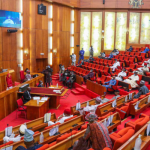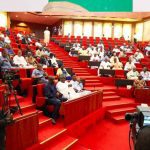The 2021 budget which was scheduled to be passed today by the Senate has been postponed till Monday next week.
President of the Senate Ahmad Lawan who disclosed this at plenary on Wednesday, said the development followed new items of expenditure transmitted to the National Assembly by the Executive.
He said that the Committee on Finance will work through the weekend to capture the fresh requests from the executive in their 2021 Appropriation Bill report.
Mr. Lawan said that the Senate would hold a special session on Monday 21 December, 2020, to consider and pass the 2021 budget.
In recent times, there have been disagreements between the executive and the National Assembly over the passage of the annual Federal Government budget.
As a result of the power tussle between the executive and the legislature, the budget implementation has always commenced very late into the year.
President Muhammadu Buhari had in October presented the 2021 budget to a joint session of the National Assembly with aggregate expenditure of N13.08trn.
The President said the proposed N13.08trn expenditure comprises Capital Expenditure of N3.85trn, Non-debt Recurrent Costs of N5.65trn; Personnel Costs of N3.76trn; Pensions, Gratuities and Retirees’ Benefits of N501.19bn; Overheads of N625.5bn; Debt Service of N3.124trn; Statutory Transfers of N484.49bn; and Sinking Fund of N220bn to retire certain maturing bonds).
President Buhari had said the 2021 Budget deficit inclusive of Government Owned Enterprises and project-tied loans is projected at N5.2trn, adding that this represents 3.64 percent of the budget size.
The aggregate revenue available to fund the 2021 budget is projected at N7.89trn which is 35 per cent higher than the 2020 revised budget of N5.84trn.
To promote fiscal transparency, accountability and comprehensiveness, the budgets of 60 Government Owned Enterprises are integrated in the Federal Government’s 2021 budget proposal.
In aggregate, 31 per cent of projected revenues is to come from oil related sources while 69 per cent is to be earned from non-oil sources.
Overall, the size of the budget has been constrained by relatively low revenues.














